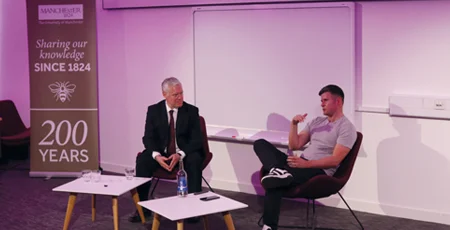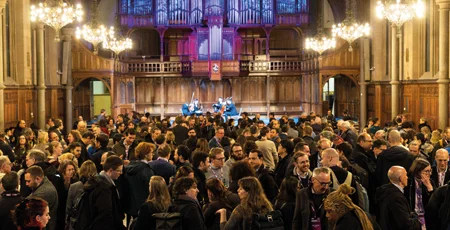Entrepreneurship for all
Aurore Hochard on inclusion, innovation and impact.
With a career that bridges startups, education and strategic leadership, Aurore Hochard brings a global mindset and entrepreneurial drive to The University of Manchester.
In her role as Director of Entrepreneurship for the Masood Entrepreneurship Centre, she is helping shape a university-wide culture where innovation thrives — from research labs to lecture halls. We caught up with Aurore to explore her journey, her vision, and why she believes entrepreneurship belongs to everyone.
Can you tell us how you came into this role?
I didn’t come from a business background — far from it. I was raised in a traditional home in the Loire valley in France, and I’m a first-generation university student. But I’ve always been curious, eager to explore and learn.
Through Erasmus, I studied in Austria and England before heading to the US to complete a BA in Commerce. I then pursued a master’s in teaching and began my career in education. But everything changed when my husband and I relocated to London in 2009.
What was the turning point?
Law school. That’s when the entrepreneurial spark hit. In 2010, I launched my first start-up — a peer-to-peer marketplace aimed at connecting neighbours in a big city like London. It was about bringing communities together through small tasks and shared value.
How was it stepping into the start-up world without a business background?
Wildly intense. We had no idea what we were doing, just passion and determination. Against the odds, we got into a major incubator, competing against more than 1,000 applicants. We scaled quickly, hiring developers globally and even meeting the Prime Minister. But start-ups need funding to grow, and despite all the momentum, we made the hard decision to close the business. Still, the lessons were invaluable. Chaotic, thrilling, exhausting — an incredible experience.
What brought you back to education?
I wanted to support other aspiring entrepreneurs by sharing what I’d learned the hard way. That led me to Bayes Business School, where I spent 10 years developing programmes to empower students and professionals as entrepreneurial leaders.
And then you came to Manchester. What drew you here?
I’d never been past Wolverhampton before the interview! But I was blown away by the size and calibre of the University of Manchester. The energy, the talent, the diversity — it felt like a place where real innovation could happen. It was the right opportunity at the right time.
At Manchester you’re working with researchers far beyond the business school—from cancer research to graphene. What excites you about this?
This is exactly what drew me here. These researchers are tackling global challenges, solving problems that affect us all. Entrepreneurship isn’t just launching a company, it's creating real world solutions that make a difference.
Innovation doesn’t only come from business schools. It’s happening in research labs, tech spaces, and unexpected corners of the University. I inherited a strong Entrepreneurship Centre and was given the space to shape it. What I love is the blend of academic rigour and practical experience. It’s a great foundation for supporting diverse innovators.
Some say entrepreneurship cannot be taught. Do you agree?
I disagree completely. You can absolutely teach the fundamentals such as strategy, finance, how to avoid common pitfalls. I wish I’d had access to the kinds of programmes we offer here when I started my first business. As the saying goes, 'you can read a book on swimming, but at some point you have to jump in the water'. That's why we focus on experiential learning, putting knowledge into practice.
What’s your vision for entrepreneurship at Manchester?
We’re aligning with the University’s 2035 strategy while making entrepreneurship more inclusive. It’s not just for future CEOs. It's for undergraduates, postdocs, and researchers with great ideas. PhD students and researchers are a big focus for me. Many of them are developing breakthrough technologies with commercial potential and they just need support to see that. I visited the Graphene Centre recently, and the possibilities there are incredible. Helping researchers see the real world impact of their discoveries is a huge priority.
How do entrepreneurs shape the future?
They solve real problems and improve lives. In times of uncertainty, we need more people who are resourceful, resilient, and willing to challenge the status quo.
How does Manchester’s growing reputation fit into this?
Manchester’s getting a lot of attention and rightly so. It’s a hub for talent and innovation. I want to help retain that talent. We lose too many graduates to London but if we show them the opportunities here, they’ll stay, create value, and build businesses that thrive locally.
We also need to build stronger bridges between investors and start-ups to make Manchester a recognised entrepreneurship hub.
Looking to the future, how do you see entrepreneurship education evolving?
It has to stay experiential and agile. You don’t teach entrepreneurship the same way you teach economics or history. It’s about learning by doing and facing real world challenges, not hypothetical case studies.
Take AI as an example. You cannot ignore it, you need to understand and use it. The best entrepreneurship education prepares people for what’s coming, not just what’s already here..
If entrepreneurship education can instil confidence and strategic thinking, it becomes transformative.
Finally, why do we need more entrepreneurs?
Because they are the changemakers. If the same companies are run by the same people ten years from now, nothing will evolve. Entrepreneurs challenge old systems, rethink what’s possible, and move us forward. Without entrepreneurs, we simply wouldn’t progress.
“Entrepreneurs challenge old systems, rethink what’s possible, and move us forward. Without entrepreneurs, we simply wouldn’t progress.”






